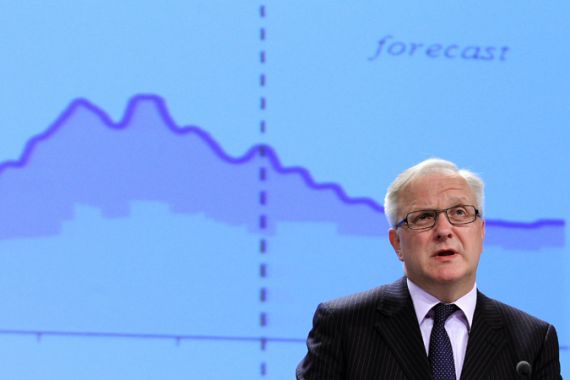Brussels hosts crucial EU budget talks
European leaders meet in Belgium’s capital for two-day summit to try to agree a deal on union’s next long-term budget.

European Union leaders are set to be locked in tough negotiations late into the night to finalise the bloc’s 2014-20 budget, as leaders meet in Brussels for an EU summit.
The 2014-20 budget tops the agenda for the two-day conference attended by the British Prime Minister David Cameron, German Chancellor Angela Merkel, and French President Francois Hollande, and chaired by Herman Van Rompuy, the President of the European Council.
Starting on Thursday at 14:00GMT, the sessions are set to cover relations with the EU’s north African neighbours and progress on free trade deals with the United States, Japan and others.
Budget negotiations on Thursday, however, hinge on finding a compromise between British and German-led calls for EU cuts to match the austerity of national governments, and French and Italian-led demands to ring-fence money for investment in areas that can generate jobs and growth.
The European Commission, the EU’s executive arm, initially wanted a five percent increase in member state contributions to $1.4tn euros for 2014-20 but Rompuy cut that back to some $1.315tn (973bn euros) for the failed November summit.
Diplomats said Rompuy will reduce that further to $129.8bn (960bn euros) in search of a compromise.
He is also expected to lower spending, the payments made to member states, to a level Cameron might be more comfortable with, but which MEPs would likely condemn outright.
Uncertainty
Cameron in late January promised to give the British people a referendum choice on whether to stay in the EU or leave if he won the 2015 election. This would threaten Britain’s membership and contribution to the EU bloc.
The EU is hoping that increased trade can deliver much needed growth to an economy snagged in recession and suffering record unemployment, another reason cited for protecting investment spending.
The proponents of a trimmer EU budget argue that cuts should be applied across the board and reach right down into wages and tax-free benefits for about 35,000 EU civil servants, some of whom have begun strike action against possible redundancies.
Meanwhile, the EU parliament has been flexing its muscles as its approval is now needed for any budget deal, with assembly head Martin Schulz saying EU politicians were ready to throw out any agreement they think falls short.
Luxembourg’s Prime Minister Jean-Claude Juncker cautioned on Wednesday that EU leaders will not decide the issue on their own since parliament’s position will be “important and central … parliament has to give its assent, not just its opinion”.